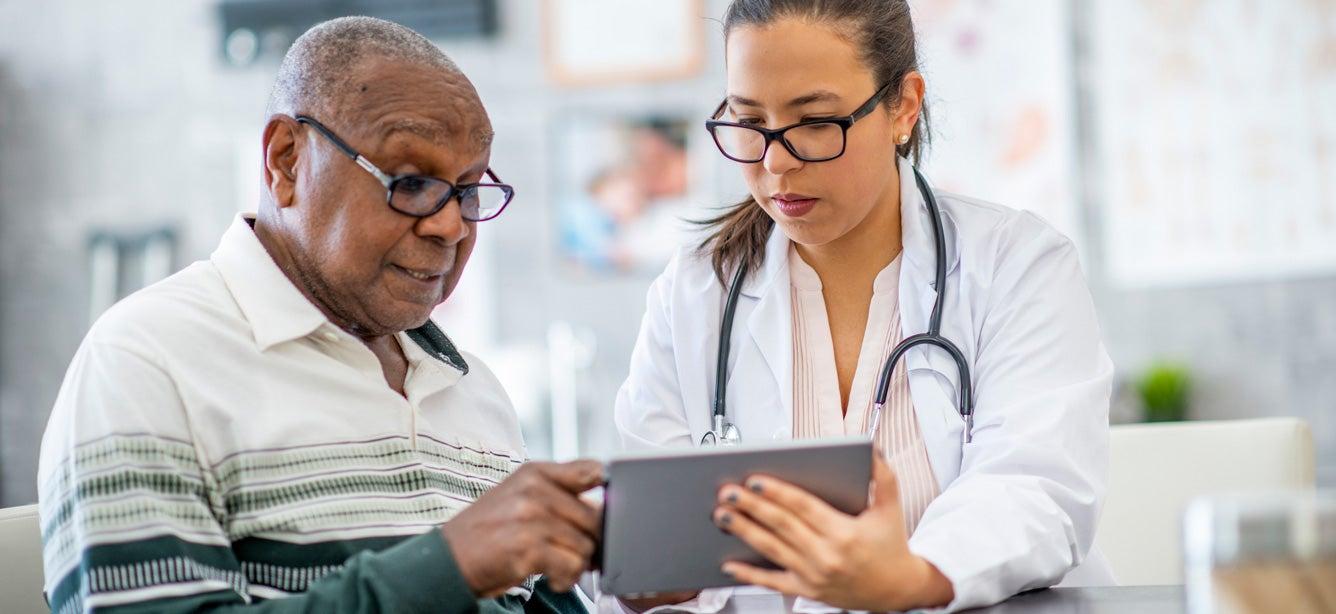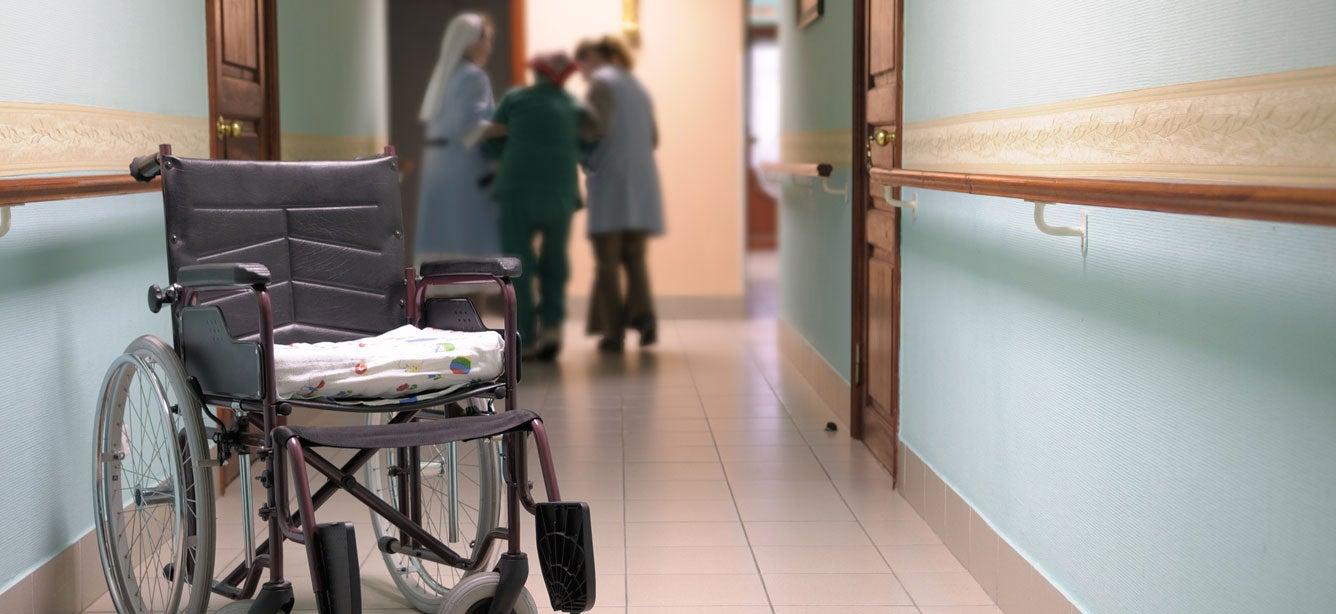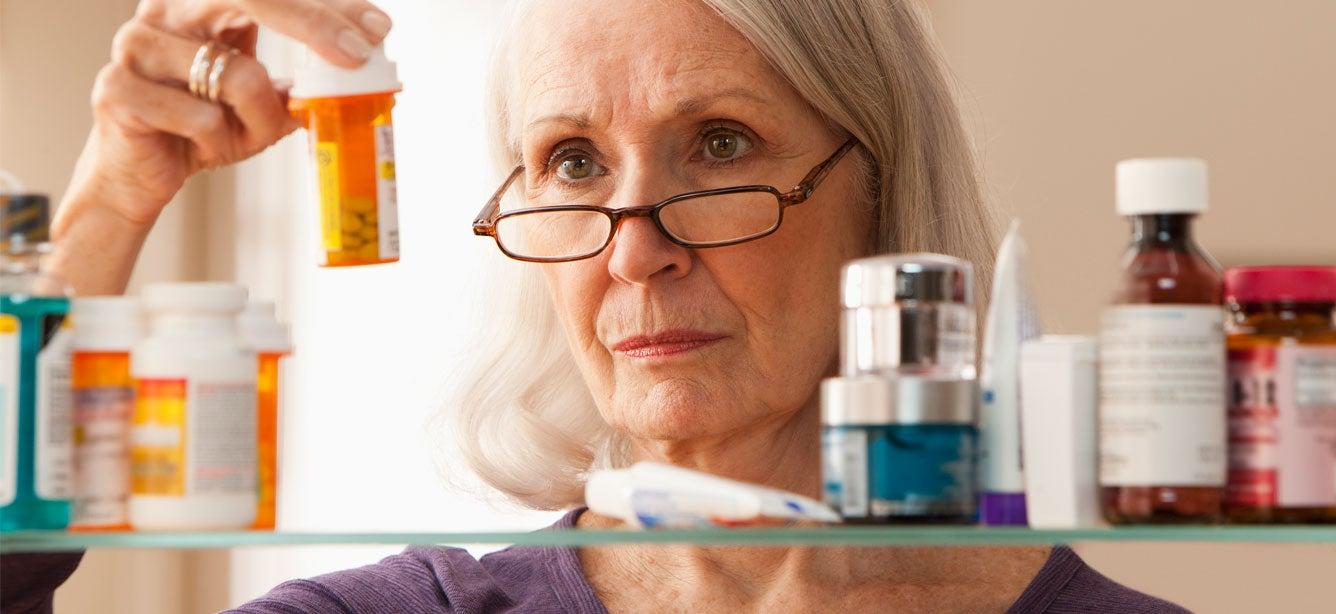
Related Topics
"I keep spotting people saying, why is she bald? She needs to get a wig.”
That’s what Cynthia Erivo, the Academy Award-nominated actress of Wicked, told ElleUK during a 2024 interview. And then she added, “I like my bald head.”
Erivo lends a very public face to a growing trend: people of all ages proudly displaying their naked domes as symbols of empowerment and allure. Whether they’ve shaved their locks intentionally (as Erivo did), lost their hair to cancer treatment, or simply have left it to nature, these women and men are bucking conventional standards and expectations of how people should look. Bald—as the saying goes—is beautiful.
But that doesn’t mean we all feel this way. Many of us don’t want to go, or be, bald. Just the thought of it alone can be distressing.
“Pop culture certainly can make things worse,” explained Amanda Krisher, Associate Director of Behavioral Health for NCOA’s Center for Healthy Aging. “On the one hand, we see celebrities, news anchors, and TikTok influencers with impossibly full, shiny, and perfect hair—which can make us feel embarrassed and inadequate in comparison,” she said. “On the other, we see famous personalities whose ‘bald pride’ can make us feel vain about our own hair loss and guilty for feeling that way. It’s kind of lose-lose.”
That’s why Krisher is on a mission: to reassure anyone and everyone facing hair loss that all feelings about it are valid. “Anxiety, depression, and low self-esteem are normal,” she said. “And there’s a lot of information and support out there to help you cope with your changing appearance.”
The strategies and resources covered below can help you re-take control of your confidence and improve your quality of life.
The psychological effects of hair loss in older adults
The older we get, the more likely it becomes to develop the visible timestamps of age: Wrinkles. Sun spots. A few new sags or bags. Thinning hair, too.
In fact, age-related hair loss is so common that millions of us go through it. By the time we’re 50, as many as half of men and nearly a quarter of women will show signs of inherited pattern baldness.1 Yet—perhaps more so than anything else—a receding hairline is a stark and unwelcome reminder of the passing years.
“Almost from the time we’re born, our hair is part of our identity,” Krisher explained. “Its color, its texture, its length and style. People recognize us by it. Friends, family, and complete strangers offer opinions about it. We obsess about how it looks and spend a lot of money to care for it. So when our hair starts to fall out, it’s a big deal. We can feel a profound sense of loss.”
That loss can show up in different ways for different people. Still, know that you are not alone. Some of the most common effects of hair loss on your mental health include:
- Anxiety and depression
There are many unknowns when it comes to hair loss. Sometimes, it’s genetic and irreversible. Others, it’s triggered by illness or medication and eventually will grow back. But it’s impossible to know the difference unless you go to the doctor. Even then, you may not find the reassurance you seek. That makes it hard to control your feelings and reactions.
For example, when you first start losing your hair, you might develop anticipatory anxiety: a state of constant worry triggered by fear of the unknown.2 Am I going to go bald? I can’t go bald! What will people say? It’s normal to feel some concern about your current and future hair loss, Krisher said. But it’s important to know that chronic (ongoing) dread about baldness can lead to panic attacks, social and generalized anxiety disorders, and even depression.3
Hair loss understandably can make you sad. You can feel down on yourself and the way you look. If you notice these feelings becoming more persistent—if you’re uninterested in activities that used to excite you, are more easily irritated, or can’t shake thoughts of hopelessness—then you might be depressed.
- Social withdrawal and isolation
If you’re embarrassed or self-conscious about your hair loss, it may feel easier to stay home than go out in public.
“Our self-esteem and confidence are so tied up in our looks,” Krisher said. “When we lack confidence, it’s frankly stressful to be around others.” This, too, is understandable; but if you opt out of social events and connections too often, you can end up making things worse.
As the pandemic lockdowns and restrictions made clear, long-term social isolation can cause loneliness and worsen any anxiety and depression you may already live with. At a time when you could benefit from it the most, you risk losing out on the emotional support and understanding that can help you better navigate your hair loss journey.
- Grief due to feelings of lost youth and vitality
Have you heard of “subjective age?” It’s a thing. The term describes our own unique perception of how old we are—a perception that has nothing to do with the calendar. We might be 68 … but our heads and hearts say different. Like, decades different. Usually, our subjective age hovers well below our chronological one.
Why does this matter? Because hair loss throws a wrench into the works. When our subjective 35-year-old self peers into the mirror and someone much older peers back, “it can be a gut-punch,” Krisher explained. “We’re confronted with evidence of aging, and we can experience real feelings of loss around that.”
Again, society doesn’t help. We live in a culture that prizes youth and leans into tired tropes (think, “Okay, Boomer!”). When we no longer look young, we can start to feel irrelevant, pushed aside, and washed up. It’s helpful to recognize that grief is a natural response to this.
- Body dysmorphia
Body dysmorphia is a clinical mental health disorder that develops when you perceive a physical flaw in yourself that others don’t—and you can’t stop thinking about how you look.4
If you’re preoccupied by your hair loss or baldness, you risk becoming body dysmorphic. Further, the condition is linked to depression, anxiety, social withdrawal, and obsessive-compulsive impulses.
“None of us feels 100% good about the way we look 100% of the time,” said Krisher. “Body dysmorphia is different. The feeling is constant, and impossible to rationalize. And it can truly interfere with your quality of life.”
Practical tips and strategies to help cope with losing your hair
All of this said, there are many effective ways to navigate the psychological effects of hair loss. From self-care to professional mental health counseling, dietary improvements to cosmetic aids, it’s possible to reclaim your confidence and self-esteem. Here’s how.
- Maintain social connections
It may take time and practice to feel comfortable in public, especially around people you don’t know well. Be gentle with yourself and remember that social bonds are invaluable. The people who care about you do so no matter how much hair you have or how it looks. Be open and honest with friends and family about how you’re feeling; they can be a welcome source of comfort and encouragement.
- Join a support group
Sharing your experiences, fears, and hopes with other people who are losing their hair can help you feel less alone. Check your local paper, neighborhood forums, and community bulletin boards for groups in your area. You can even ask your dermatologist for suggestions. If you don’t live near an in-person meeting or don’t have a good way to get there, consider a virtual option. Start by searching “online support groups for hair loss.”
- Seek mental health care
If you’re struggling to cope with your hair loss on your own, a skilled mental health counselor can help. In particular, a licensed professional can lead you through cognitive behavioral therapy (CBT)—a form of psychotherapy that teaches you how to recognize and change negative thinking patterns that interfere with your goals, relationships, and daily life. You can even participate in this kind of therapy from the comfort of home. (Learn more about online therapy).
- Follow a healthy diet
As the American Society for Nutrition explains, “the relationship between nutrition and mental health is bidirectional: the foods we eat affect our mental health, and our mental health status affects what and how well we eat.”5 Paying attention to what’s on your plate is a form of self-care that can fuel positive thinking and combat body dysmorphia. Plus, getting enough nutrients like iron, B12, and protein can slow or prevent some types of hair loss.
- Try over the counter products
From scalp oils to vitamin-infused thickening shampoos, to dietary supplements and more, you can find a variety of products to boost thin and thinning hair. Most of these are available at your local pharmacy or favorite online retailer. While your individual results may vary—and depend on the type of hair loss you have—there’s generally no harm in testing them out. The one exception? If you’re trying any supplement that’s new to you, it makes sense to talk to your doctor first. Some OTC herbal remedies can negatively interact with prescription drugs you may already be taking.
- Consider wigs, hairpieces, and other cosmetic aids
Looking good can help you feel better. And that’s where “wearable hair” comes in. Now widely available for men and women in all price ranges, you can buy full wigs, partial crown toppers, and extensions in specialty salons and over the internet. And you’ll find plenty of online tutorials and a vast community of hair-wearers to guide you. If you’re not ready to take this step, you might try concealing powders and creams or specialized styling products for thinning hair. Many retailers carry these.
Medical considerations and treatment options for hair loss
In some instances, your hair loss may be reversible.
That’s why it’s a good idea to consult a dermatologist or other health care professional if you notice thinning hair. They can help identify what’s causing your hair loss and whether medical intervention might help. Treatments can include prescription and nonprescription drugs and therapies like:
- Finasteride (brand names Propecia and Proscar). Prescribed for men with androgenetic alopecia (AGA, or age-related pattern baldness).
- Minoxodil (brand name Rogaine). Available over-the-counter as topical liquid, gel, or foam that you apply directly to your scalp.
- Nutritional supplements. If your hair loss is related to your diet, over-the-counter vitamins and minerals may help.
- Laser. Initial studies show that low-level therapy potentially can treat pattern baldness and even increase hair density in men and women.
“Coping with hair loss is a psychological process,” Krisher pointed out. “At the same time, losing your hair in the first place is a physical process—one that might be triggered by an underlying condition. When you take a holistic approach to this experience, you truly give yourself the gift of proactivity. That alone can provide the confidence you need to face the unknown road ahead with your self-esteem intact.”
Resources and where to find help
- American Hair Loss Association
- The American Academy of Dermatology Hair Loss Resource Center
- Scarring Alopecia Foundation
- The Women’s Hair Loss Project
- American Psychological Association - Psychologist Locator
Sources
1. American Osteopathic College of Dermatology. Androgenetic Alopecia. Found on the internet at https://www.aocd.org/page/AndrogeneticAlopecia
2. Jayne Leonard. Wha to know about anticipatory anxiety. December 18, 2023. Found on the internet at https://www.medicalnewstoday.com/articles/anticipatory-anxiety
3. Craig N. Sawchuk, Ph.D., L.P. Depression and anxiety: Can I have both? Mayo Clinic. October 15, 2024. Found on the internet at https://www.mayoclinic.org/diseases-conditions/depression/expert-answers/depression-and-anxiety/faq-20057989
4. Mayo Clinic. Body dysmorphic disorder. December 13, 2022. Found on the internet at https://www.mayoclinic.org/diseases-conditions/body-dysmorphic-disorder/symptoms-causes/syc-20353938
5. American Society for Nutrition. How to Boost Mental Health Through Better Nutrition. April 18, 2023. Found on the internet at https://nutrition.org/how-to-boost-mental-health-through-better-nutrition/



